What is the meaning of Nietzsche's Antichrist?

"Anti-Christianity "of the author of "Antichrist" is not directed at the teachings of Christ, the Savior's authentic idea, but only in the way it was" used "by the priests - the human type against which Nietzsche is filled with sincere indignation, in a sense fully justified. It is undeniable that Nietzsche's "anti-Christianity" grew up in the soil of Christianity itself. The first is unthinkable and unrepeatable without the second, without Christianity as a "practice" and as a form of life, in many cases tearful and even contrary to its authentic idea. And if Christianity, according to Nietzsche, constantly generates and at some stage grows into nihilism, in the form of a life called nihilism, in the reverse order of thought it is quite justified to say that it is through nihilism that it passes so we can return to the authentic understanding of life, expressed by Christ. It is by itself clear that nothing is worth a virtue that has not experienced and did not "know" sin, in sin has not found itself, through victory over sin has not reached itself, to virtue as a suffered denial of sin and "evil"; so in the same way nihilism as "antichristianity" is a failure in sin and in the "abyss", thanks to which the return to Christ is justified, to the "hard ground" upon which the existence of the "non-sterile" of the living person is possible. In this sense, it can be said - in favor of Nietzsche's nihilism, of course - that Nietzsche is deep within himself, but seeking the way for Christ, a Christian-frustrated Christian who in order to reach his "virtue" is compelled to climb so many steep, rocky and hard-to-walk paths, and perhaps many bogs, of which another (other than Nietzsche) would never come out. This is the least because the denial of something is in fact a complete dependence on the denial, it is not a "burning of bridges", but rather the laying of new bridges that are immaculately strong and indestructible.

Nietzsche, with his own thought, heart, and hands, builds such a bridge between himself and Christ, which has cost him a gigantic effort and a "sweat" that has been said at the beginning of Scripture to sow the way of man to God. This painful bridge to God, even if it sounds too "heretical," called by Nietzsche superhuman, constitutes Nietzsche's teachings about the superhuman. Adding "something of himself" to the creation of God called man, removing the human imperfection and weakness at least in the plan of an idea, Nietzsche is not entirely independent both from Christianity and from man as being and as a "nature" that is unthinkable outside The creation of God and the continual instillation of life and power of life. Nietzsche wants to reinforce this vigour in order to become power, and this "overwhelming" that he wants to give to man and whose roots are in man does not contradict the human, but is just something that can grow on the pledge from God he starts. How can we understand the Nietzschean achievement, called "super-human," is it a total denial, reprisal and destruction of man? Nietzsche says - a super-human: this "overpower" is the negation of man, but of his weakness and infirmity; on the other hand, this "man" is a confirmation of man - of his power and vigour but both are present in God's creation, called man. The superhuman is a man in his "superstition", in his majesty and fullness; the superhuman has defeated the "lower" in man - in order to exalt the "upper", "the higher" in it, that is, what is Godlike in man, which is the imprint of God in man.

The cult of holiness is a cult of disease, according to Nietzsche, pacifying his intolerance to holiness, that is, sickness. Reconsider the literal anti-Christian meaning in pro-Christian, given a whim. Sacredness was disease, disease became holiness. There is justification of radicalism in which a saint and a criminal are identified: as far as they are "inseparable and unworthy" available and performed in the genius provocateur. These "great religious and sick people" objectify, so to speak, their experience (either from deeds or only thought) in the face of character figures who can be thought of as "criminals" - or in "criminal" thoughts (speeches). There is a lack of distinction between "responsible" and "irresponsible" "provocateurs." And the religious tradition - at least that of the Eastern and especially of the Russian Church - clearly distinguishes the figure of the saint, because it is first righteous, responsible because it is first righteous, "provocateur". Nietzsche's angry exposures are directed against the whole present-day life that gives birth to the "last man": "the most contemptible man who will no longer be able to despise himself", who turns everything into something small, lives with the "little pleasures" animal. Contemporary are the inhabitants of the "countries of culture" who have borrowed from all peoples and ages, diverse ideals and values. Reducing the person in his weakness and "degeneracy" - "man is something to be overcome" - Nietzsche actually raises man, his power, majesty, nobility, "breeder", that is, what is given to him at birth, but which he managed to suppress, "defile" or at least forgot. The man cleansed from "impurity" is the superhuman as he was probably before the Fall, ignorant of the dichotomy of morality and weakness Adam, the authentic man created by God with love and placed as master of the earth.
So far when you get a chance to read or re-read more Nietzsche, you should pay attention to how the pieces relate to each other and where they fit in the work overall because the individual sections and parts/books within all his books are connected and ordered more than you say (especially from The Gay Science on). So, I don't agree that The Anti-Christ is exceptional in that regard. Understanding where the sections fit in a work helps one interpret the sections or parts/books. For instance, the sections leading up to "The greatest weight" in TGS indicate what Nietzsche is saying about ER there. Likewise, the sections leading to to "the madman" help interpret that section.
I agree with you. In "Also sprach Zarathustra" this connectivity is most clearly seen. Each of the chapters is opposite to the other and goes to the other extreme. This is under the laws of the unconscious, and in this illogicality it can be traced much more clearly to what Nietzsche want to say. You can see there in one sentence the whole idea of the book and of Nietzsche's philosophy - "a book for everyone and no one"
This reminded me, I did an essay about correlation between Nietzsche's Antichrist and Lars Von Trier's Antichrist in college, maybe I will translate it during February.
Thanks for inspiration!
good content posts always
Thanks :)
Love me some Nietzsche

:)
i like it, nice post.
Thank you :)
great post. i'll be expecting more
Nice :)
Every post you are incredible
Thank you very much :)
I think that most people including Nietzsche's don't understand that Christ came to fulfill the law (ten commandments). Matthew 5:17 states "Do not think that I have come to abolish the Law or the Prophets; I have not come to abolish them but to fulfill them." You see @godflesh if we find ourselves at the hard bridge to God that Nietzsche found himself having to cross we find that we have fallen from His grace.Now that Christ has fulfilled the law there is nothing more that needs to be done here on earth. He has fulfilled the purpose of every being which is why in the new testament it is written "You who are trying to be justified by the law have been alienated from Christ; you have fallen away from grace." - Galatians 5:4.
As per my knowledge i hear that Nietzsche's Antichrista is a book in which it was explained about
Christianity itself as a belief & a practice.
This is all i know
I also want to know more about it more
An unforgettable history